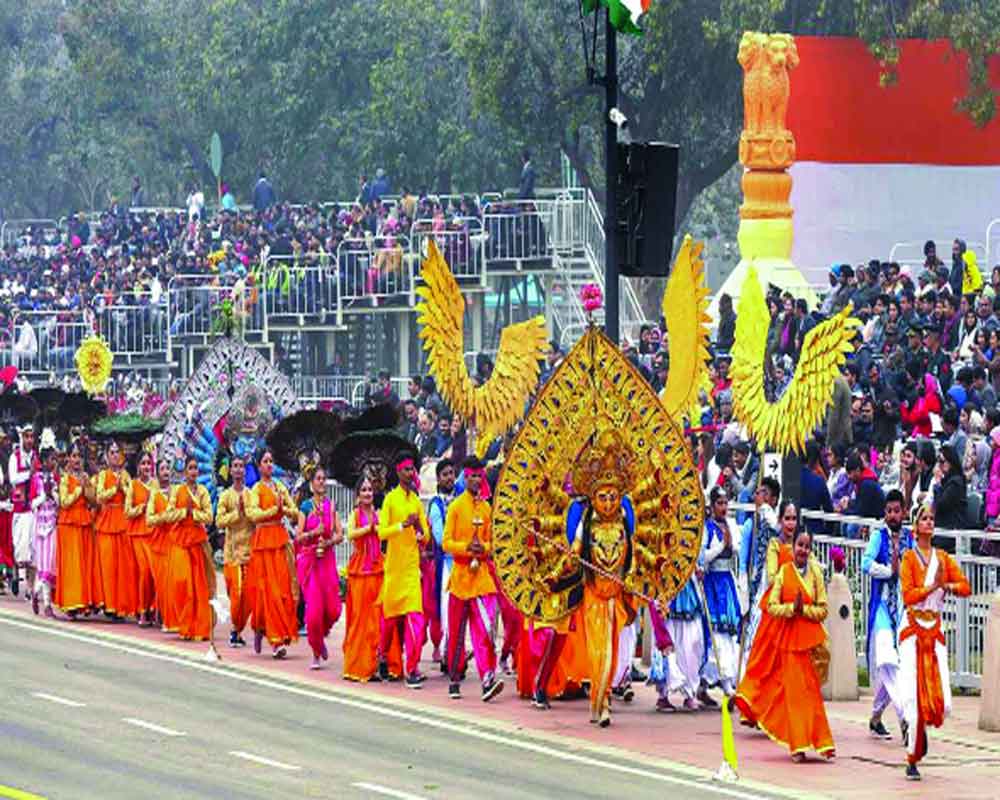Gradually, the military traditions are being overshadowed. The Republic Day Parade has transformed from a military display to a political and cultural event with military elements
Prime Minister Narendra Modi’s mere mention during the tri-service Commanders’ conference in 2022 on the ‘rich heritage of ancient Indian strategic thinking’ as part of ‘dismantling colonial legacy’, in short, “Indianisation” of strategic culture set the cat among the pigeons. In the absence of any strategic operational directives or White Paper, political leadership employs oral instructions. I recall individual service chefs devising their service strategy based on Prime Minister Manmohan Singh’s annual Commanders address.
The three services policy briefs would be integrated by IDS for jointness. This was before the theatrisation era, the groove in which the needle is stuck since 2019 when Gen Rawat was appointed CDS and ordered to theatrise. But we now know from two former security czars and one Foreign Secretary – Narendra Vohra, Shivshankar Menon and Shyam Saran – that a national security strategy was prepared and ready for release thrice but political will was absent. Similarly now, leaving theatrisation to CDS and service chiefs, a collegium of equals to square the circle – is impossible. Theatrisation has to be a political decision like CDS was.
So services attempt what is possible: the mission to Indianise colonial heritage. While the Navy is changing ‘gears’, badges of rank and ensign, the Air Force is silent on its transformation. The Army as usual is in a tizzy changing the names of cantonments, roads and so on. Project Udbhav was intensely impressive in rediscovering the Indic heritage of state and battle crafts and grand strategy. A Military Heritage Festival to tap indigenous military skills was aimed to extract military wisdom from 5000-year civilization imbibing from religious scriptures and Arthashastra by Chanakya, though not long ago, Rand Corporation’s George Tanham, a friend of India’s said: “India has no strategic culture”. That shook the cuckoo’s nest. Maj Gen (retd) BS Dhanoa hit the bull’s eye when he wrote that ancient military wisdom will not replace the need for niche weapons and technology. Inference: these exercises are diversions by the government for not providing funding for modernisation. This year, minus pensions, defence allocation is 1.4 per cent of GDP.
This returns us to the costless exercise of Indianisation and disrobing colonial heritage. Like hiring and now firing Gorkhas from Nepal, tinkering with Republic Day Parade, Beating Retreat and so on. The Modi government prides itself on its impeccable nationalist policy on defence and security. Instead of India catching up with China, Beijing is galloping to catch up with the US leaving New Delhi miles behind. Symbolism – jumlas as the opposition calls it – issued are par excellence. For the government Indianisation of the military also translates to subtle politicization. This has never been as stark as in the last decade. The military content of the Republic Day parade has been stripped, and replaced with police and para militaries. Gradually military is being sidelined by the second line of defence. Republic Day Parade has transformed from a military pageant to a political and cultural show with military frills.
When I was a kid living in Lucknow Cantonment in the 1950s, I would watch Gorkha squads march by and listen to military bands play on Sundays at Mohamad Club. Gorkhas will soon no longer march down Kartavya Path and military bands beating retreat along Vijay Path won’t sound the same. Military bands are very colonial, specifically pipes and drums that are specially designed to play Scottish Highland tunes. They do not lend easily to Indian compositions. Soldiers who play pipes and drums are the medical platoon in the battle for casualty evacuation. Each Infantry battalion has a medical platoon which doubles up as pipers and drummers. Pipers sway to Highland music. The sway is to be gentle but evocative, not what Indianisation has made pipers resemble -hip-hop musicians.
While commanding a Gorkha battalion, I introduced the Madal, a Nepali drum into the pipes and drums with an eye to fusing it with Nepali tunes. The Madal was removed from the band after I left office. Trying to fuse Indian instruments like flute, tabla, harmonium, and conch shells into marching music is a steep uphill. This year 31 very unfamiliar Indian tunes made their debut. It would have been better to gradually phase out old colonial scores while phasing in indigenous tunes. Old favourites like 100 Pipers, Abide with Me, and Col Bogey’s March have become history. The only marching tune that cannot be wished away is Sare Jahan Se Achha composed by Mohd Iqbal (though it too might disappear). Some of the new scores were Kargil, Tiger Hill, Swadesh, Vikrant and the Navy’s vocal rendition of Jai Bharati. The bands of the Army, Navy, Air Force, paramilitary and police (they were infiltrated in 2016) played splendidly in perfect formations. The pipes and drums of the army raised the curtain followed by brass bands of the paramilitaries and police. Then came the brass band of the Air Force, Navy and Army. Long after sunset, at 6.15 heralding dusk, buglers sounded the retreat as the tricolour was rolled up for reveille the next day and another Retreat the next year.
On matters traditionally military it is time CDS and service chiefs told the MoD bureaucrats and the political class to take it easy on Indianisation. Otherwise, politicization will march ahead masquerading as Indianisation. Dismantling colonial legacy must be handled with caution and care preserving military traditions, customs and ethos.
(The writer, a retired Major General, was Commander, IPKF South, Sri Lanka, and founder member of the Defence Planning Staff, currently the Integrated Defence Staff. Views are personal)


























